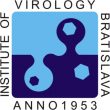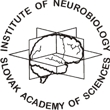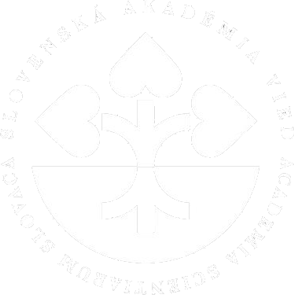Institutes
Institute of Experimental Endocrinology
RNDr. Daniela Gašperíková, DrSc.
director
E-mail: daniela.gasperikova@savba.sk
Tel.:02/ 32295271
Ing. Viera Dubová
bibliographer and assistant to the director
E-mail: ueensekr@savba.sk, viera.dubova@savba.sk
Tel.: 02/ 32295249
Our mission
We help people
You have questions

History of the institute
Read more
The research activity of the Institute in the 1950s and 1960s was mainly focused on studying the prevalence and etiology of the endemic goitre in Slovakia, which affected up to 70% of women. At the initiative of our institute, the established full-body iodination of the kitchen salt was manifested by a rapid decline in the prevalence of goitre in the young generation, the decrease in thyroid disease and the increase of IQ in children from the most affected areas of Slovakia. At present, the Institute's research activities focus on the most progressive trends in the research of etiopathogenesis, diagnosis and treatment (personalized) in selected areas of endocrinology, neuroscience, genetics and metabolism with emphasis on the detection of molecular regulatory mechanisms in health and disease in the areas of research described above.
Institute of Experimental Endocrinology
The History of the Institute of Experimental Endocrinology SAS began with Decree of the Health Authority of the Czechoslovak Republic, establishing an institute of endocrinology for Slovakia in 1951, to be based in Bratislava and tasked with endocrinology screening and care of the Slovak population. In 1954, on the basis of the SAS Presidium´s resolution, the Institute of Endocrinology was integrated into SAS. Starting from 1969, in connection with its scope of operations changing to prevailingly experimental research, the name of the institute was changed to the Institute of Experimental Endocrinology SAS. Since 2016, the Institute has become a part of the newly established Biomedical Research Center of the Slovak Academy of Sciences (BMC SAS).The research activity of the Institute in the 1950s and 1960s was mainly focused on studying the prevalence and etiology of the endemic goitre in Slovakia, which affected up to 70% of women. At the initiative of our institute, the established full-body iodination of the kitchen salt was manifested by a rapid decline in the prevalence of goitre in the young generation, the decrease in thyroid disease and the increase of IQ in children from the most affected areas of Slovakia. At present, the Institute's research activities focus on the most progressive trends in the research of etiopathogenesis, diagnosis and treatment (personalized) in selected areas of endocrinology, neuroscience, genetics and metabolism with emphasis on the detection of molecular regulatory mechanisms in health and disease in the areas of research described above.
Cancer Research Institute
Mgr. Miroslav Chovanec, PhD.
director
E-mail: miroslav.chovanec@savba.sk
Tel.: 02/ 32295127
Ing. Gabriela Fialová
assistant to the director
E-mail: gabriela.fialova@savba.sk
Tel.: 02 / 32295105
We help people
You have questions

History of the institute
Read more
CRI BMC SAS is an experimental workplace that studies cancer disease in a complex way. Cancer prevention, diagnosis and therapy predominate in these studies. Modern approaches and state-of-the-art methodologies of the biomedical research are all well-established in the environment of the Institute. Traditional research directions of the Institute has been transformed into today’s time and include research fields, such us retroviruses, genome stability and DNA repair mechanisms, genetic and epigenetic changes in cancer disease, cancer stem cells, tumor microenvironment and heterogeneity, cancer cell phenotypes, mutagenic and carcinogenic activities of various chemicals, newly developed chemotherapeutics, the effects of phytochemicals on cancer cells, nanomaterials useful in clinical oncology, diagnostic and prognostic biomarkers, mechanisms responsible for the response of cancer cells to anti-cancer treatment, stratification of cancer patients to personalize their treatment, as well as a few other.
Cancer Research Institute
The history of the Cancer Research Institute (CRI) of the Slovak Academy of Sciences (SAS) dates back to 1946 when Institute for Cancer Research and Therapy had been established. After several changes of its name, the Institute detached the research section, creating in 1969 the CRI SAS. Since 2016, the Institute has been a part of the Biomedical Research Center (BMC) of the SAS.CRI BMC SAS is an experimental workplace that studies cancer disease in a complex way. Cancer prevention, diagnosis and therapy predominate in these studies. Modern approaches and state-of-the-art methodologies of the biomedical research are all well-established in the environment of the Institute. Traditional research directions of the Institute has been transformed into today’s time and include research fields, such us retroviruses, genome stability and DNA repair mechanisms, genetic and epigenetic changes in cancer disease, cancer stem cells, tumor microenvironment and heterogeneity, cancer cell phenotypes, mutagenic and carcinogenic activities of various chemicals, newly developed chemotherapeutics, the effects of phytochemicals on cancer cells, nanomaterials useful in clinical oncology, diagnostic and prognostic biomarkers, mechanisms responsible for the response of cancer cells to anti-cancer treatment, stratification of cancer patients to personalize their treatment, as well as a few other.
Institute of Virology
MVDr. Juraj Kopáček, DrSc.
director
virukopa@savba.sk
Tel.: 02/ 59302404
Tel.:02/ 54774284
Bc. Zuzana Lackovičová
assistant to the director
E-mail: viruzula@savba.sk
Tel.: 02/59302405
We help people
You have questions

History of the institute
Read more
The main mission of the Institute is:
• to perform scientific research of biological and molecular properties of human, animal and plant viruses, Chlamydiae and Rickettsiae,
• to investigate molecular mechanisms of cancer,
• to accomplish scientific education,
• to develop active cooperation with the domestic as well as foreign research institutions and universities,
• to publish the research results in periodic and non-periodic press and edit an international journal Acta virologica,
• to provide advisory and expert services related to main activities of the Institute.
Since January 2016, the Institute of Virology has become a part of the newly established Biomedical Research Center of the Slovak Academy of Sciences (BMC SAS), where it has entered together with the Cancer Research Institute, the Institute of Experimental Endocrinology, and the Institute of Clinical and Translational Research SAS. Within the BMC SAS, the Institute of Virology continues to fulfill its original mission and develop close collaborative activities with the other institutes to strengthen interdisciplinary and translational approaches and to improve research excellence according to the vision and mission of BMC SAS.
Institute of Virology
The Institute of Virology was founded in 1953 as a research institution of the Czechoslovak Academy of Sciences with the purpose to accomplish and develop scientific research in virology. In 1969, the Institute was administratively transferred under the guidance of the Slovak Academy of Sciences.The main mission of the Institute is:
• to perform scientific research of biological and molecular properties of human, animal and plant viruses, Chlamydiae and Rickettsiae,
• to investigate molecular mechanisms of cancer,
• to accomplish scientific education,
• to develop active cooperation with the domestic as well as foreign research institutions and universities,
• to publish the research results in periodic and non-periodic press and edit an international journal Acta virologica,
• to provide advisory and expert services related to main activities of the Institute.
Since January 2016, the Institute of Virology has become a part of the newly established Biomedical Research Center of the Slovak Academy of Sciences (BMC SAS), where it has entered together with the Cancer Research Institute, the Institute of Experimental Endocrinology, and the Institute of Clinical and Translational Research SAS. Within the BMC SAS, the Institute of Virology continues to fulfill its original mission and develop close collaborative activities with the other institutes to strengthen interdisciplinary and translational approaches and to improve research excellence according to the vision and mission of BMC SAS.
Institute of Clinical and Translational Research
MUDr. Miroslav Vlček, PhD.
director
E-mail: miroslav.vlcek@savba.sk
Tel.: 02/ 32295244
Ing. Viera Dubová
bibliographer and assistant to the director
E-mail: ueensekr@savba.sk, viera.dubova@savba.sk
Tel.: 02/ 32295249
We help people
You have questions

History of the institute
Read more
The Institute is focused on the research of molecular mechanisms of human disease pathogenesis, including low molecular weight signaling pathways. The main mission is to transfer the results of basic research to clinical practice to influence the onset, course and prognosis as well as diagnosis of selected civilization diseases and improve human health. The aim is to transfer the requirements of clinical practice to research with the potential to develop new diagnostic, therapeutic and preventive methodologies and procedures.
Institute of Clinical and Translational Research
The Institute of Clinical and Translational Research was founded in 2007 as the Molecular and Medical Center of SAS - a specialised organisation of SAS on the basis of preceding shared initiative by the Institute of Virology SAS, the Cancer Research Institute SAS, the Institute of Experimental Endocrinology SAS, the Institute of Molecular Physiology and Genetics SAS and the Institute of Neurobiology SAS with a view to transferring knowledge originating from basic research to clinical practice. During the first years of the independent functioning of the Institute there was a gradual change of focus and organizational structure, which in 2014 led to the change of the institute to the regular scientific-research institute of SAS. Since 2016 the Molecular and Medical Center of SAS has been part of the Biomedical Research Center of the Slovak Academy of Sciences (BMC SAS), where it has been transformed into an organizational unit called the Institute of Clinical and Translation Research.The Institute is focused on the research of molecular mechanisms of human disease pathogenesis, including low molecular weight signaling pathways. The main mission is to transfer the results of basic research to clinical practice to influence the onset, course and prognosis as well as diagnosis of selected civilization diseases and improve human health. The aim is to transfer the requirements of clinical practice to research with the potential to develop new diagnostic, therapeutic and preventive methodologies and procedures.
Institute of Neurobiology
RNDr. Ján Gálik, CSc.
director
E-mail: galik@saske.sk
Tel.: 055/ 727 6200
Fax: 055/727 6203
Ing. Ivona Kováčová, Mgr. Annamária Košová
assistants to the director
E-mail: ivkovacova@saske.sk, kosova@saske.sk
Tel.: 055/ 727 6204, 055/ 727 6201
We help people
You have questions

History of the institute
Read more
The mission of the Institute is basic research in the field of neuroscience. The main area of scientific interest is the central nervous system under physiological and pathophysiological conditions (basic and clinical neurobiology). The Institute of Neurobiology SAS is oriented to the research of nervous system of the vertebrates, its morphology, function and development studied by modern methods of applied biology. The main topics include cerebrovascular disorders as one of the most serious diseases of the nervous system in humans. Projects focus mainly on the study of mechanisms of damage to the nervous system caused by ischemia (insufficient blood supply) or trauma (injury), neuroprotection, neurotransplantation, and regenerative capacity of the central nervous system.
Institute of Neurobiology Slovak Academy of Sciences
The history of the Institute of Neurobiology Slovak Academy of Sciences (SAS) began in 1964, when the Institute of Experimental Biology of Slovak Academy of Sciences was founded. Following changes in his scientific direction, the Institute was renamed to the Institute of Neurobiology SAS in January 1977. Since 2018, the Institute is a part of the Biomedical Research Center SAS.The mission of the Institute is basic research in the field of neuroscience. The main area of scientific interest is the central nervous system under physiological and pathophysiological conditions (basic and clinical neurobiology). The Institute of Neurobiology SAS is oriented to the research of nervous system of the vertebrates, its morphology, function and development studied by modern methods of applied biology. The main topics include cerebrovascular disorders as one of the most serious diseases of the nervous system in humans. Projects focus mainly on the study of mechanisms of damage to the nervous system caused by ischemia (insufficient blood supply) or trauma (injury), neuroprotection, neurotransplantation, and regenerative capacity of the central nervous system.






